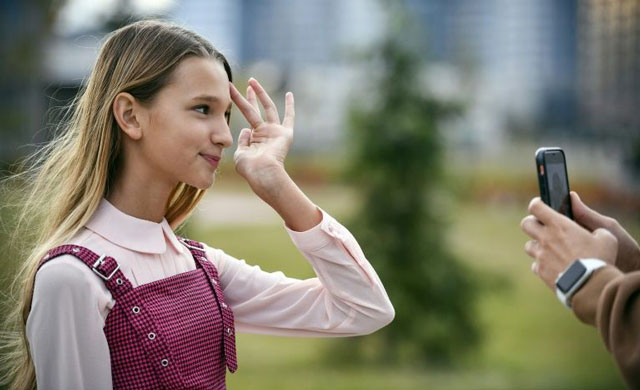
Moscow, Russia | AFP | Liza Anokhina was 11 when people started recognising her in the street. Now a year older, she is one of Russia’s most popular child bloggers with 2.3 million followers on Instagram.
In a Moscow park, her producer jogs backwards, using his phone to film as Liza runs and blows raspberries. Tall and slim and wearing thick makeup for the shoot, she squeals with laughter when she views the result.
“We’ve done (Instagram) ‘stories’, now we’ll do TikTok,” the 25-year-old producer Ivan Bushmelev tells her, referring to her main social media platform.
Russia counts some 40 million Instagram users, behind only Indonesia, India, Brazil and the United States, according to data firm Statista.
And the photo-sharing platform is, as elsewhere in Europe, particularly popular among children, analysts say.
Instagram and other platforms have spawned a generation of young “influencers”, leading to concerns that parents might exploit children for financial gain.
Another risk is that the desire to accumulate “likes” may be psychologically damaging for children.
Such concerns have forced social media companies themselves to react, with YouTube and Instagram moving to make such blogs less attractive to advertisers and to make “likes” invisible to users other than the creators.
Yet many Russian parents encourage their children to blog and even send them to classes to improve their skills.
The youngest child bloggers unwrap toys or sweets. Older ones like Liza speak on camera and film sketches. They earn from ads and by promoting products, as brands value their connection with their peers.
– Earnings a ‘secret’ –
Liza clutches her phone in a pink plastic case, admitting that she uses it eight hours a day.
The clips on her Instagram anokhina_elizabeth_2007 are ultra-polished and looping, with visual effects and music.
Asked how her earnings have changed her family’s life, she gives what sounds like a well-practised answer: “It has changed our life for the better. I prefer to keep the topic of my earnings a secret.”
Revealing few details, she says her mother is a lawyer while her father is a former military man.
She vows to keep on creating content, even as social media platforms prepare to bring in changes that could hit her channels.
To combat cyber-bullying, Instagram is experimenting with hiding the number of “likes” on others’ posts. And from next year YouTube will bar targeted ads in videos aimed at children.
“It is a problem because of the way viewers are: they’re used to seeing numbers,” Liza’s producer says of the potential Instagram changes. “Not just viewers but advertisers, too.”
Fans, both girls and boys, come up to take selfies with Liza.
“She speaks well, she’s clever, she makes interesting videos,” says Natalya Usacheva, 12, while Veronika Kosynkina, also 12, says she aspires “to dress just as stylishly” as Liza.
For Moscow-based child psychologist Viktoria Karavayeva, top child bloggers, just like school sports stars, could develop “dependence on popularity — that is, likes, comments, people talking about them.”
This could lead to “dependence on outside reactions and approval, tunnel vision only on this,” she said.
While it is normal for teenagers to value their peers’ esteem, those who are “very sensitive to comparisons and outside judgement” may come to crave online likes, she said.
– Big earnings, many subscribers –
At a video blogging class at Moscow’s Coddy programming school, 11-year-old Artyom Shalovey has big ambitions.
“I’m constantly waiting for the moment when I get 1 million subscribers,” he said, planning to blog on computer games, pranks and BMX bike stunts.
He has a way to go, with around 130 subscribers currently.
“For me, it’s important both earning lots of money and having lots of subscribers,” he says.
During the two-hour class, children discuss topics, write scripts and shoot with their phones.
Their 23-year-old teacher, Amela Shabotich, is a student at Moscow’s Higher School of Economics. She says she enjoys seeing children’s blogs develop, with topics ranging from fashion modelling to learning English.
Psychologist Karavayeva says parents tend to be more concerned with rationing the time their children spend on gadgets than with the content, and some children see material that scares them.
She “has encountered various fears (among children) after watching certain videos or films discussed in their social group.”
Parents should follow their children’s favourite bloggers and “discuss things that bother them,” she suggests.
“I don’t think simple restrictions or a ban can eradicate parents’ fears or create understanding in the family. In general, I’m for talking.”
A mother-of-three who gave her name only as Yulia admitted she was stunned by her children’s viewing choices, such as videos showing children cracking open endless chocolate eggs to find toys.
“Imagine my amazement when I found out what they were watching,” she said of her children aged 7 to 10.
“I always thought kids really liked Winnie the Pooh… but no, if you leave them on YouTube they actually end up with someone unwrapping hundreds of Kinder
 The Independent Uganda: You get the Truth we Pay the Price
The Independent Uganda: You get the Truth we Pay the Price


